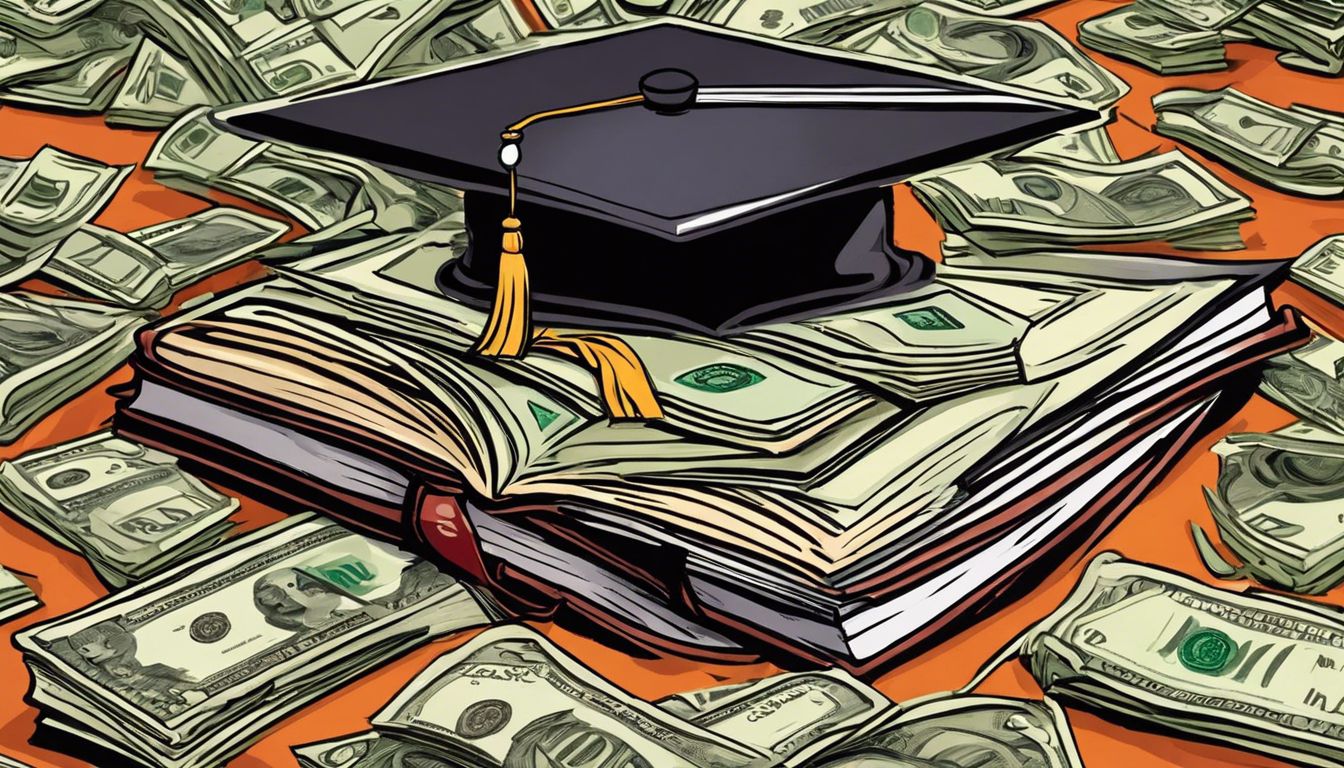Facing the mountain of college debt can feel like a daunting task. A smart move is knowing that scholarships and grants don’t need to be repaid. This article will guide you through practical steps to keep your wallet happy and your future bright, free from the chains of heavy student loans.
Ready to dive in?.
Key Takeaways
- Choose a college carefully to reduce costs. Look at community or public schools that offer low tuition or free tuition.
- Apply for scholarships and grants because they are like free money for your education and don’t need to be paid back.
- Work part – time jobs or start a side hustle while in school. This helps pay bills without needing loans.
- Make a budget and save money. Know how much you have and where it needs to go each month.
- Learn about different loan repayment plans, especially ones based on your income, to save money over time.
Understanding the Different Types of College Debt

To avoid drowning in student debt, know what you’re up against. From loans to grants, each type comes with its own set of rules.. and escape plans.
Student Loans

Student loans can seem like an easy fix for college costs, but they add up fast. Before taking out a loan, it’s smart to look into the four types of federal student loans. Each type has its own rules and interest rates.
Choosing the right one could save you money in the long run. Also, know that owing money on student loans makes some people regret their degrees..
A big fact: U.S. folks owe $1.74 trillion in student debt! This huge number shows why it’s key to think hard about borrowing for school. Look for scholarships and grants early—they’re like free money for your education.
And don’t forget, talking about college choices with family helps avoid surprises when bill time comes around.
Grants and Scholarships

Grants and scholarships are like free money for your education. You don’t have to pay them back, ever. This makes them a big help in cutting down on student loan debt. In fact, they cover 35% of college costs for many students.
Hunting for these financial aids can be your ticket to saving tons of money.
Applying for grants might seem easier because the process is more straightforward than scholarships. Yet, don’t overlook scholarships; they can really pay off too. Both options need some work – filling out forms, maybe writing essays or showing your grades – but think about it, it’s worth it if you end up with less debt at the end of your college journey.
Working while Studying

Having a job while you study is smart. It helps pay some bills and keeps student loans low. Jobs on campus, like work-study programs, fit well with class schedules. Off-campus jobs are also an option.
They can offer more hours and money. Either way, working part-time means you borrow less.
Look for jobs that add to your resume too. Being a resident advisor covers housing costs. Internships in your field might pay and teach valuable skills. Every paycheck from these jobs means less debt later.
Plus, learning to manage work and study time sets you up for success after graduation.
Private Student Loans

Moving from working while studying to another form of funding, private student loans come into play. Banks and lenders offer these with often changing interest rates. They’re trickier than federal student aid because they lack flexible repayment plans.
This means, after graduation, you might find it hard to pay back what you owe based on how much money you make.
Private loans can put a heavy load on your wallet over time. Unlike federal pell grants or income-driven repayment options, these loans don’t adjust based on your earnings. It’s key to think long and hard before choosing this route for college money.
Look into every other option—like scholarships, part-time jobs, or saving ahead—to keep debts low and save money in the long run.
Strategic Steps to Avoid Debt as a College Student

Navigating college without sinking into debt is like walking a tightrope, but with the right steps, you can make it to the other side unscathed. Dive in and discover how..
Carefully choose your college

Picking the right college can seriously cut down your debt. Look for schools with low tuition fees or those that offer free tuition. Some colleges don’t make students take loans at all.
This is a big deal because it means you won’t owe lots of money after you graduate. Check out community colleges or public schools in your state to save even more. They often have lower costs and might give credits for advanced placement tests.
Also, using tools like the net price calculator helps see how much school really costs. Don’t forget to fill out the Free Application for Federal Student Aid (FAFSA). It can get you grants, which are better than loans since you don’t have to pay them back.
Every bit saved matters and choosing wisely could mean not worrying about huge debts later on.
Consider alternative funding sources

After selecting the right college, dive into finding money that you don’t have to pay back. Scholarships and grants are gold here. They’re gifts for your education. You don’t return them like loans.
Start your hunt early—there’s a lot out there waiting for you. Websites, school counselors, and local community groups often share these opportunities.
Crafting a side hustle or working part-time can also bring in extra cash. This way, you’re not just relying on others; you become your own source of funding. Whether it’s tutoring online, crafting and selling things, or freelancing with your skills, there are many paths to explore.
Remember, every dollar earned is one less borrowed.
Work part-time or have a side hustle

Exploring alternative funding sources leads naturally to the idea of earning your own money. Getting a part-time job or starting a side hustle can make a big difference. This approach helps manage college costs and cuts down on the need for student loans.
You could look for jobs on campus or in local businesses. These options often offer flexible hours suited to your class schedule.
Having your own source of income not only supports you financially but also builds valuable work experience. Imagine balancing classes and a part-time job; it teaches time management, responsibility, and hard skills that employers value.
Plus, earning your own money means you can start saving early, which is always a smart move.
Budget and save money

Earning from a part-time job or side hustle sets the stage for your next smart move—budgeting and saving money. It’s like knowing what you have in your wallet before spending it on needs, wants, or savings.
Make a plan for how you will use every dollar that comes in. This way, when surprises happen—and they will—you’re ready.
Start by writing down all the money you expect to get each month. Then list out where it needs to go, like for books, food, rent, and maybe some fun too. Don’t forget about setting aside some cash for emergencies.
This habit keeps you from reaching for a credit card and diving into debt when things pop up. If you keep track of where your money is going each week, adjusting becomes easier if needed to avoid running out of funds before the next paycheck hits.
Discuss repayment plans

Learning about different repayment plans can save you a lot of money on your student loans. Some plans let you pay based on how much money you make, known as income-based repayment.
This way, if you’re not making a lot right out of college, you won’t be overwhelmed with huge payments. Looking into loan forgiveness programs is another smart move.. especially if you plan to work in public service or for a non-profit.
They might forgive some or all of your debt after a certain number of years.
Exploring repayment options early helps manage your loans better over time. You won’t feel stuck and will have more control over your finances. Also, knowing the terms for forbearance can give you breathing room during tough times without hurting your credit score too much.
So, digging into these details before and after taking out loans makes a big difference in staying ahead of debt.
The Importance of Avoiding College Debt

Avoiding college debt sets you up for financial freedom, letting you chase dreams without heavy chains.
The long-term impact on finances

Student loans can tie you down. Think about it – saving for a house? That gets harder. You want to stash money away, but big debt cuts into your future plans. Surging student debt hits hard, especially for younger folks trying to reach their dreams.
Middle-income families feel the squeeze too, with 60% more debt piling up compared to lower-income students. This means less money for things like vacations, building credit, or even starting a business.
It’s a tough cycle – more debt equals fewer chances to grow your wealth over time.
The burden of debt after graduation

Graduating college should feel like a big win. Yet, for many, it’s the start of a tough journey with student loans debt. The money that could go to savings or a home down payment gets eaten up by loan payments.
This isn’t just bad news for the individual but hurts the U.S. economy too.
Having student debts hang over your head can limit what you do next. Want to buy a house? That might have to wait. Dreaming of starting your own business? Financial burdens make this harder.
In short, the choices you’d like to make are often pushed aside because of hefty monthly payments towards education loans and interests.
The potential impact on future financial goals

Carrying student loan debt into the future can make buying a home feel like a distant dream. This weight slows you down, making it hard to save for big goals. Think about it – when your money goes towards paying off college loans, there’s less to put into savings or invest.
Young people today find themselves stuck, unable to move forward with plans like owning a house because their finances are tied up in debt repayments.
Saving becomes challenging, and investing in other dreams takes a back seat. The longer this debt hangs over you, the harder it is to reach milestones that seem easy for others who don’t have this burden.
It’s not just about homes; starting a business or traveling can also be pushed aside. Being wise about avoiding college debt means more freedom to chase after what matters most to you later on.
Conclusion

Avoiding debt in college can feel like a big challenge, but it’s doable with the right steps. Choose your college smartly and look for scholarships and grants early on. Work part-time if you can, and always keep a budget to avoid borrowing more than necessary.
Remember, every dollar you save or earn is one less you’ll owe later. This way, you start your future on strong ground, not buried under loans.
FAQs
1. How do I get college credit without big loans?
You can earn college credit before even stepping foot on campus! Try taking Advanced Placement (AP) classes or be part of the College-Level Examination Program. They let you skip some courses in college, saving money.
2. Are there ways to lower my tuition bill?
Yes, for sure! Look into in-state tuition options—they’re usually cheaper. You could also work as a Resident Assistant; they often get free room and board.
3. What’s the deal with FAFSA?
FAFSA stands for Free Application for Federal Student Aid. It helps you find out what kind of student financial aid you can get—like grants that you don’t have to pay back!
4. Can working while studying help me avoid debt?
Absolutely! Many students grab part-time jobs or look into work-study programs linked to your field of study… it cuts down on loans and builds your resume.
5. Should I think about community colleges or online education first?
Yeah, starting at a community college or via online classes can cut costs significantly… then, transfer those credits to a four-year school later!
6. Any tips on managing small expenses?
Keep an eye on spending habits… like using e-banking apps to track where your money goes every month—including what’s spent on textbooks and meals outside.